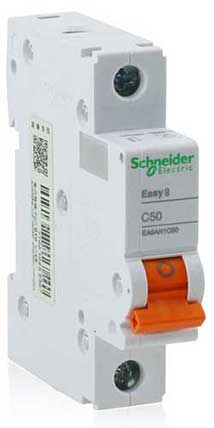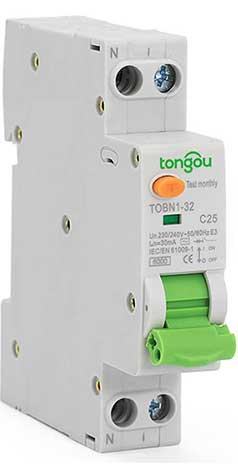Electrical Safety - All about circuit breakers
Electrical Safety Devices - Circuit Breakers
Probably the most important safety device in our homes is the contact breaker. They prevent fires and they prevent us from being electrocuted.
There are many different types for different purposes and circuit breakers must be sensibly chosen and properly installed. Fuses, circuit breakers (MCBs), earth leakage detectors (ELCBs) and residual current devices (RCBOs).
Here we explain what they are, how they work and why they are important to keep us safe.
Types of Circuit Breakers
Contact Breakers are designed to detect if there is a fault, usually a short circuit, in the electrical cricuits and a building and automatically switch the power off to prevent damage, people being injured or fires starting. Fuses were the first circuit breakers and were used for many years. These days there are far more sophisticated devices which are used to cut the power if there is a problem.
Let us look at some of these different devices and what they are used for.
Fuses
A fuse was a short piece of soft wire that people fitted in a porcelain holder and plugged into electrical circuits. If for some reason there was a problem and too much electricity flowed through the soft wire it would melt cutting off the electricity supply. They were very effective in stopping washing machines from glowing red andhouses from burning down. Once the problem had been found and fixed someone would go crawling around in the darkness of the kitchen searching for the fuse wire in the junk drawer. Then they would find a screwdriver and dig around in the fuse box.
Fuses are still used for some purposes notably in car electrical systems, in modern fuses the soft metal is encased in a glass tube and the fuses are easy to replace as they push into an easy to change fuse holder.
Miniature Circuit or Current Breaker or MCB

Fuses were quite primitive devices and many years ago they were replaced by switches or as electrical type people tend to say “circuit breakers”. The ones used in houses these days are quite small and hence the name Miniature Circuit Breakers also known as MCBs.
Your house has a main electrical box somewhere with your main electrical supply cables coming in and lots of smaller cables going out to carry power to each of the electrical circuits in your house. Each circuit has an MCB, a switch in a plastic mounting, on it so you can switch the circuit on and off. The clever part is that if too much power goes through the switch it automatically switches itself off.”
Now at this point dear reader you can get all huffy and say this is all far too technical for a Wednesday morning and your coffee has gone cold but this is important. The next time you plug in your pubic hair curler and the power cuts out with that ever so recognisable “phut” sound you will have to find that electrical box and switch the MCB back on.
There is one basic problem with MCBs, if there is a fault and someone gets an electric shock, they do not operate quickly enough and by the time the MCB switches itself off there has already been enough power to kill.
This lead to the development of the earth leakage detector.
Earth Leakage Contact Breaker or ELCB
An ELCB Is an Earth Leakage Circuit Breaker and how it works is this. When someone gets an electric shock it is caused by electricity passing through their body from a live electrical source such as a loose live electrical cable they have touched or perhaps a faulty washing machine or other device where an electrical cable has somehow become connected to the body of the machine making it live.
The ELCB detects that there is a leakage of electricity to earth and instantly switches itself off. It will operate very quickly, even quicker than a banker grabbing his bonus, in fact so quick that people don’t get electrocuted.
Many people will never have seen an ELCB in Indonesia. This is because, if your house has one, it will be lurking unnoticed in the depths of your main electrical panel. Quite a few buildings with 3 phase power do have ELCBs installed but most don’t work because they have often been bypassed by frustrated electricians.
ELCBs may be bypassed because the electrical wiring is not good enough
Here we come to the concern. ELCBs are very sensitive. They are usually installed on the main incoming electricity supply which means that if there is any slight fault anywhere in a building the ELCB will keep switching itself off, which they inevitably do - frequently. So frequently in fact that in most cases you will find the ELCB has been disconnected or rendered ineffective. Rather than endlessly trying to find the causes of the problems so called electricians usually install wires to bypass the ELCB.
This is not surprising. In the average building there are so many possible causes of power leakage that it would be very difficult to find and repair them. Rats eating cables, poorly connected electrical fittings, nails through cables, faulty appliances and, probably the most common, the use of cheap cable bought to save a meagre few sheckles.
Earth Leakage Contact Breakers or ELCBs versus Miniature Circuit Breakers or MCBs
It is important to note that ELCBs and MCBs perform 2 different functions:
An MCB protects your house from electrical overload which may be caused by too many appliances switched on at once or by a short circuit. Electrical overload is when there is too much electrical current flowing through a circuit, the copper wires get hot melting the insulation and setting it on fire. This is one of the main sources of house fires across the world.
An ELCB protects a person from being electrocuted when they touch something that is live and there is a flow of electricity through them to earth.
Combine the two functions and you have an RCBO
Residual Current Breaker with Overload Protection or RCBO

Just to get really complicated there is yet another device which combines both of these functions into one switch. The RCBO or Residual Current Breaker with Overload Protection.
Your house and other buildings have switches (known as MCBs or Miniature Circuit Breakers) in the main electrical panel that automatically switch off if there is too much electrical power flowing into the circuits in your house. There is one of these switches on each of the many circuits in your house. These MCBs protect the house against fires but they do not protect people from being electrocuted.
There is a more sophisticated type of switch available that does the same job as the MCB but also automatically switches off if someone gets an electric shock. They operate very quickly such that the shock is so small that it will not hurt the victim. These are known as RCBOs or Residual Current Circuit Breakers with Overload Protection. If you wish to protect little Johnny from getting curly hair when he inquisitively sticks his fork in the plug socket you need RCBOs on your electrical circuits
If you have RCBOs installed you may have problems with them switching themselves off frequently if your electrical systems are not good enough. Do not give up on them they can save your life. For your safety it is a very good idea to have your electrical circuits upgraded so you can use RCBOs.
Requirements for Safe Electrical circuits:
To operate correctly your electrical systems will need:
- High quality electrical cable to have been used in the wiring circuits.
- An earth connection that is working correctly.
- Cables installed correctly within protective piping to prevent damage particularly from rats.
- RCBOs installed on individual circuits rather than on the incoming supply to the whole house.
Ground Fault Circuit Interrupters (GFI) and Appliance Leakage Current Interruptors (ALCI)
In the good old US of A, where the UOA (use of acronyms) is becoming so UICP (ubiquitous in common parlance) that people don’t bother much with fully articulated response terms anymore, these switches are most commonly known as GFCIs (ground fault circuit interrupters), GFIs (ground fault interrupters) or ALCIs (appliance leakage current interrupters) or BSHCOA (bleeding switch has cut out again).
Residual Current Devices (RCD)
In Australia these clever little devices are sometimes known as Residual Current Devices (RCDs) or trip or safety switches, in Indonesia they are known as RCBOs.
Phil Wilson
Copyright © Phil Wilson August 2012
This article, or any part of it, cannot be copied or reproduced without permission from the copyright owner.
